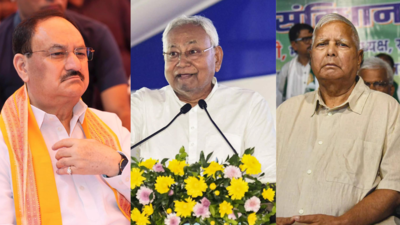
Addressing the audience, Kumar, without directly naming Lalu Prasad Yadav or his party, expressed regret over the partnerships formed during his tenure. His comment, “Those who were in power before me did nothing,” served as a clear reference to Yadav and his government, which held power in Bihar before Kumar rose to prominence. Kumar's assertion, "It was a mistake on my part to have gone with them on two occasions," highlighted his disapproval of past decisions to align with the RJD, an alliance that had seen the two parties collaborate intermittently over the years. This statement not only emphasized his disassociation from Yadav but also underscored his stronger commitment to the BJP-led NDA.
The timing of Kumar’s remarks holds particular significance given the political landscape in Bihar and beyond. Nitish Kumar’s influence in the state has long been a decisive factor, and his alliances have historically been a barometer for power shifts in Bihar’s complex political scene. By addressing his past alliances in this manner, the chief minister appeared to cement his commitment to the BJP, while also distancing himself from the RJD—a party he has alternated between opposing and collaborating with over the years.
This latest move is seen as a calculated effort to further consolidate his political base within the NDA, as tensions rise ahead of upcoming elections. Kumar’s JD(U) has been an important ally for the BJP in Bihar, contributing significantly to its electoral success in the state. His reflection on the “mistakes” of aligning with Yadav serves as a subtle yet powerful signal to voters and political observers alike, reinforcing the divide between his current political commitments and past associations.
JP Nadda, who was present during the event, appeared to welcome Kumar’s statements. While the BJP president refrained from directly commenting on the matter, his presence signaled the BJP’s continued support for Kumar’s leadership within Bihar. The BJP has long maintained a strong foothold in the state, and its partnership with JD(U) has been essential for securing electoral victories. With Nadda's support, the BJP appears poised to maintain this crucial alliance, despite occasional differences between the two parties.
Nitish Kumar’s history of shifting alliances has often drawn criticism, but it has also been a reflection of the political pragmatism that defines his leadership. Over the years, Kumar has aligned with both the BJP and the RJD at different points, navigating the turbulent waters of Bihar’s political landscape. His first alliance with Lalu Prasad Yadav’s RJD was seen as a significant political experiment, but it eventually fell apart amid ideological and governance differences. After rejoining the BJP-led NDA, Kumar briefly returned to the RJD fold in 2015, forming the Mahagathbandhan (Grand Alliance) with Yadav and the Congress, which won the Bihar Assembly elections that year.
However, the Grand Alliance proved short-lived. In 2017, citing disagreements and corruption charges against key RJD leaders, Kumar once again broke ties with Yadav and returned to the NDA, where he has remained ever since. His leadership has been characterized by these sharp political turns, and his tenure as chief minister has often been marked by such recalibrations, all aimed at maintaining power and influence in the state.
Kumar's latest comments appear to reflect his desire to close the chapter on his political flirtation with Yadav and the RJD. The JD(U) and RJD’s historical rivalry dates back to the 1990s when Nitish Kumar emerged as a political force in Bihar, challenging the dominance of Lalu Prasad Yadav. Kumar’s governance style, focused on development and law and order, has been positioned as a direct contrast to the RJD’s populist, caste-based politics.
This rhetorical distancing from the RJD is also significant in the context of Bihar’s shifting political dynamics. While the RJD remains a formidable force, particularly with the leadership of Tejashwi Yadav, the son of Lalu Prasad Yadav, Nitish Kumar’s comments could resonate with voters looking for stability and governance over populist rhetoric. His association with the BJP, a party that has emphasized economic development and a hardline stance on law and order, offers a clear alternative to the RJD’s approach.
The BJP’s strategy in Bihar, much like in other parts of India, has relied on forging strong regional alliances to consolidate its influence. The partnership with Nitish Kumar and JD(U) has been one of the most successful examples of this approach, allowing the party to maintain dominance in a politically volatile state. Kumar’s critique of his former allies strengthens the narrative that the NDA remains the most stable option for governance in Bihar, and that the alternative—an alliance with the RJD—has been fraught with complications.
